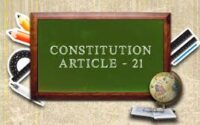Is Right to Reservation not considered as Fundament Right?
This Article is written by RIYA KAUSHIK studying LL.B. in GEETA INSTITUTE OF LAW and Curated by Sahana Arya.
Fundamental Rights enshrined in the Constitution of India are those rights which are essential for the Socio-economic, moral-spiritual and intellectual growth of the citizens of India. These are the basic rights which are essential in nature and are obligatory so as to realize the Right of Life and Liberty in Article 21 of the Constitution of India. Because Right to Life doesn’t mean merely an animal life, but Right to Life with Human dignity. The fundamental right is enshrined for this purpose in the Constitution of India.
There are several other rights provided under the Constitution of India; but these rights are not obligatory in nature. The fundamental rights provided under the constitution of India are obligatory in nature and if any of the fundamental right of a person is violated, then he can approach to Supreme Court to enforce that Right.
But the Rights which are not fundamental in their nature and are not obligatory can’t be enforced by Supreme Court. They are Constitutional Rights and are enabling in nature, one can approach to High Court if any other right which is not fundamental in nature to plead.
Now talking about Right to Reservation; To realise the promise of equality enshrined in the Constitution of India, Reservation is introduced in it. Right to Reservation is enshrined in Article 15 and 16 of the Indian Constitution. Reservation is given to the “socially and educationally backward classes of citizens”
Article 15(4) says that there should be no discrimination on the grounds of Religion, Race, caste etc.; while the Article 16(4) empowers the state to make special provisions for the Backward classes in Public Employment. These are enabling provisions based on discretion of government and are not obligatory.
Now, a question arises that if the Right to Reservation is violated that can one approach to Supreme Court to Enforce it? In other words, Is Right to Reservation a Fundamental Right?
Right to reservation is not a Fundamental Right as observed by the Supreme Court in the Case of Tamil Nadu where parties withdraw plea for quota. The parties allege that the Central Government is violating the Right of fair education of the People of Tamil Nadu by not implementing the 50% quota for Backward classes and Most Backward classes.
Does it mean that Reservation is not a Fundamental right?
Reservation is indeed not a Fundamental right; In the precedents also, it is mentioned that the Right to Reservation provided under Article 15(4) and 16(4) of the Constitution do not impose an obligation and it is applicable on the discretionary power of the government. In case of R. Balaji vs State of Mysore, the apex court held the same that the Right to Reservation is not and obligation and subject to discretionary power of the appropriate Government.
In many more cases like A. Rajendran vs Union of India, Indira Sawhney vs Union of India & in M Nagraj vs Union of India, the apex court reiterated the decision held in R. Balaji vs State of Mysore Case.
The latest judgement of the Apex Court makes it clear that the Actions allowed in Constitution flow from “enabling provisions” and are not Rights as such. Article 16(4) is also enabling in nature. In other words, the state is not bound to provide reservation.
In the Article itself, it is mentioned that it is at the discretion of government to make provisions regarding reservation and they may make provisions for the same if they found it justified.
Now, another question arises why Right to Reservation is not a Fundamental Right?
The Reservations provided in the Indian Constitution are for the equality of opportunities to all citizens without any discrimination. The time when the Reservation were introduced in the Constitution of India, was a time when the lower class were treated crudely by the upper-class people and to bring equality in the status of both “Reservations” were introduced.
But now the scenario has changed; a lot of amendments have been made in the Constitution of India. There are many more provisions introduced for bringing equality in status quo. The concept of reservation which is enshrined in the Constitution was for this purpose only. But it is at the discretion of the appropriate government as to how apply them.
Thus, Reservation can’t be admitted as Fundamental Right, as the Article 14 itself lays down the Right to equality which means right to equality in all opportunities, which implies no one can reserve a better position for oneself only on the basis of reservation, the opportunity should be equal to all.
The matter which arose in front of Apex Court was related to reservation in promotions which is given under Article 16(4) which says the discretion of government to make reservation in public employment and their promotions. It is not an obligation on government to provide reservation to all. The article 16(1) also lays down the same that there shall be equality of opportunity for all citizens in matters relating to employment in any office under state. Thus, one can’t approach to Supreme court to enforce this right.
The Supreme Court in its judgement also in the case of Tamil Nadu allow to withdraw the appeal to enforce the Right to Reservation in promotions otherwise they will dismiss it. In the opinion of the Apex Court, no Fundamental Right is violated thus no writ can be made in front of Supreme Court. However, one can approach to High Court to appeal for the enforcement of his Constitutional Right.


